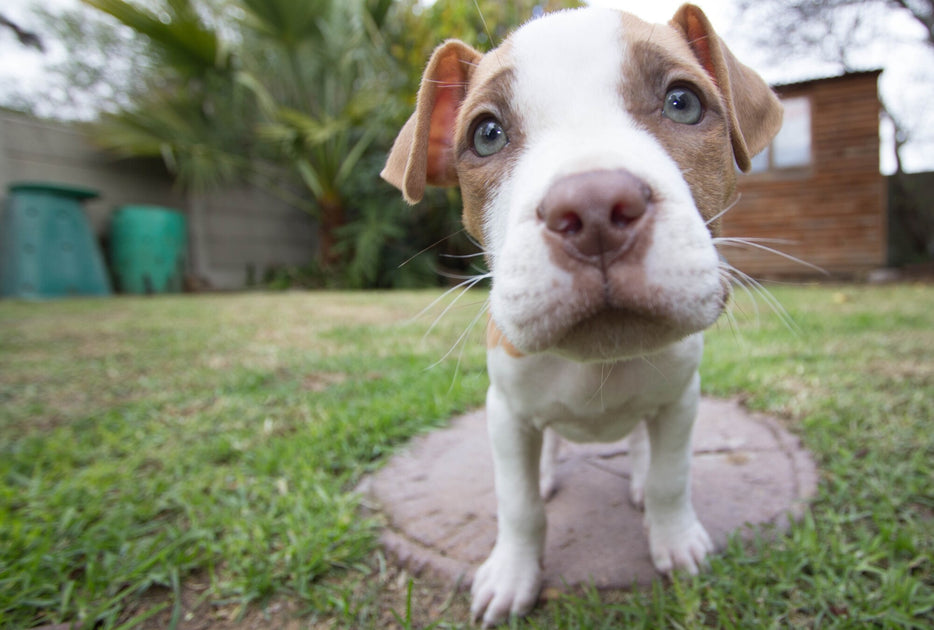As I prepare to bring a pitbull puppy into my life, I am astounded to learn that pitbulls were once America’s favorite family dog and were even known as the “nanny dog” due to their natural affinity for children. However, it is important for me to know that pitbulls have often been misunderstood and unfairly stigmatized in recent years. Despite their loyal and loving nature, these dogs may face challenges due to breed-specific legislation and negative public perception. This knowledge motivates me to be an informed and responsible pitbull owner.
Before bringing a pitbull puppy into my home, I need to understand the importance of proper socialization and training. Pitbulls are intelligent and strong dogs, and it is crucial that they receive early and ongoing training to ensure they become well-rounded and obedient pets. In fact, a study conducted by the American Temperament Test Society (ATTS) showed that pitbulls have a pass rate of 86.8% in temperament tests, surpassing popular breeds like Golden Retrievers and Beagles. This statistic reassures me that with adequate training and socialization, my pitbull puppy can grow up to be a well-behaved and friendly companion. By investing time and effort into training and socializing my pitbull puppy, I can help break the stereotypes and provide him with a happy and fulfilling life.

What Do I Need to Know Before Getting a Pitbull Puppy?
Pitbull puppies are adorable and can make great companions, but they also come with their own set of responsibilities and considerations. Before bringing a pitbull puppy into your home, it’s crucial to educate yourself about the breed, understand their needs, and be prepared for the commitments of owning a pitbull. In this article, we will cover all the essential information you need to know before getting a pitbull puppy, ensuring you start off on the right foot and provide the best possible care for your new furry friend.
Understanding the Pitbull Breed
Pitbulls, officially known as American Pit Bull Terriers, are medium-sized dogs with a muscular build and a strong, energetic nature. They have a reputation for being loyal, affectionate, and protective of their families. However, pitbulls also require proper socialization, training, and consistent exercise to thrive. Before getting a pitbull puppy, it’s important to understand that they may have certain breed-specific tendencies, such as a high prey drive or a strong desire to chew. By familiarizing yourself with the breed’s characteristics, you can better manage and meet their unique needs.
When selecting a pitbull puppy, it’s crucial to choose a reputable breeder or adopt from a reliable rescue organization. This ensures that you’re getting a well-bred and healthy puppy. Responsible breeders will provide you with information about the puppy’s lineage, health clearances, and any potential genetic issues. Adopting from a rescue organization also gives you the opportunity to provide a loving home to a dog in need. Whichever route you choose, make sure to ask questions, visit the breeder or rescue facility, and observe the puppies’ environment to ensure they are being properly cared for.
Benefits of Owning a Pitbull
– Unwavering Loyalty: Pitbulls are known for their devotion and loyalty to their owners. They often become deeply attached, forming strong bonds with their human family members.
– Affectionate Nature: Pitbulls are incredibly affectionate. They thrive on human companionship, and their love for cuddles and snuggles is unmatched.
– Great with Kids: When properly socialized and trained, pitbulls can be excellent family dogs. They are often patient and gentle with children, making them great playmates and protectors.
– Active Lifestyle: Pitbulls have high energy levels and require regular exercise. This can be a benefit to owners who enjoy outdoor activities and are committed to providing daily physical and mental stimulation.
Responsibilities and Challenges of Owning a Pitbull
– Training: Pitbulls are intelligent dogs, but they can be strong-willed. Consistent training starting from puppyhood is crucial to ensure they become well-behaved and obedient adults. It’s recommended to enroll your pitbull puppy in obedience classes and practice positive reinforcement training techniques.
– Socialization: Pitbull puppies need to be exposed to a variety of people, animals, and environments to develop into well-rounded adults. Early and ongoing socialization is essential to prevent fear or aggression towards other dogs or strangers.
– Exercise and Stimulation: Due to their high energy levels, pitbulls require vigorous exercise and mental stimulation to prevent boredom and destructive behaviors. Daily walks, playtime, and interactive toys can help keep them happy and content.
– Breed Stereotypes: Unfortunately, pitbulls often face unfair stereotypes and discrimination. It’s important to be aware of breed-specific legislation in your area and take steps to educate others about the loving nature of pitbulls. Responsible ownership and positive representation can help change perceptions.
Diet and Health Care for Pitbull Puppies
Proper nutrition is vital for your pitbull puppy’s growth and development. Consult with your veterinarian to determine the best diet for your puppy’s specific needs. High-quality, balanced commercial puppy food or a balanced homemade diet can provide the essential nutrients they require. It’s important to feed your pitbull puppy the right amount of food, divided into meals throughout the day, to maintain a healthy weight and prevent obesity.
Regular veterinary care is crucial to ensure your pitbull puppy’s well-being. Vaccinations, deworming, flea and tick prevention, and regular check-ups should be scheduled according to your veterinarian’s recommendations. In addition to routine care, pitbulls may be prone to certain health issues such as hip dysplasia, allergies, and skin conditions. Awareness of potential health concerns and regular preventive care can help keep your pitbull puppy healthy and happy.
Tips for a Successful Pitbull Puppy Ownership
– Start Training Early: Begin training your pitbull puppy as soon as you bring them home. Consistency, positive reinforcement, and patience are key to raising a well-behaved and obedient dog.
– Provide Adequate Exercise: Pitbull puppies need plenty of physical exercise and mental stimulation. Be prepared to engage in activities such as brisk walks, runs, and interactive play sessions.
– Socialize, Socialize, Socialize: Introduce your pitbull puppy to a variety of people, animals, and environments to build confidence and prevent fear or aggression. Enroll in puppy socialization classes or arrange playdates with well-behaved dogs.
– Establish a Routine: Establish a regular schedule for feeding, exercise, playtime, training, and rest. Consistency and structure help your pitbull puppy feel secure and well-adjusted.
– Show Love and Affection: Pitbulls thrive on love and attention. Shower them with affection, cuddles, and praise to strengthen the bond between you and your puppy.
Pitbull Puppy Supplies and Preparations
Before bringing a pitbull puppy home, it’s important to gather all the necessary supplies and prepare your home for their arrival. Here’s a checklist of essential items:
– Food and water bowls
– High-quality puppy food
– Collar or harness with identification tags
– Leash
– Soft bedding
– Chew toys and interactive toys
– Crate or dog bed
– Puppy-friendly shampoo and grooming supplies
– Poop bags
– Puppy training pads
– Securely fenced yard or designated potty area (if applicable)
Creating a safe and puppy-proofed environment is crucial to prevent accidents and protect your puppy’s well-being. Remove any toxic plants or household items that can be hazardous to your pitbull puppy. Additionally, consider installing baby gates to restrict access to certain areas of your home until your puppy is fully trained and trustworthy.
Bulleted List: Pitbull Puppy Supplies
– Food and water bowls
– High-quality puppy food
– Collar or harness with identification tags
– Leash
– Soft bedding
– Chew toys and interactive toys
– Crate or dog bed
– Puppy-friendly shampoo and grooming supplies
– Poop bags
– Puppy training pads
– Securely fenced yard or designated potty area (if applicable)
Conclusion
Bringing a pitbull puppy into your home is an exciting and rewarding experience, but it also requires careful preparation and commitment. By understanding the breed, providing proper socialization and training, and meeting the specific needs of a pitbull, you can ensure a harmonious and fulfilling partnership. Remember to prioritize the health and well-being of your pitbull puppy through regular veterinary care, a nutritious diet, and plenty of exercise and mental stimulation. With love, patience, and a solid foundation of knowledge, you can enjoy a lifetime of happiness with your pitbull companion.
Key Takeaways: What You Should Know Before Getting a Pitbull Puppy
- Pitbulls require lots of exercise and mental stimulation to keep them happy and healthy.
- Training and socialization are crucial for pitbulls to ensure they become well-behaved and friendly dogs.
- Pitbulls have a strong prey drive, so it’s important to teach them appropriate behavior around other animals.
- Pitbulls can be prone to certain health issues, so regular vet check-ups and proper care are essential.
- Pitbulls are loyal and affectionate dogs, but they need a responsible owner who can meet their needs.
Frequently Asked Questions
How much exercise do pitbull puppies need?
Pitbull puppies are energetic and require a good amount of exercise to keep them happy and healthy. On average, they should have around 30 to 60 minutes of exercise every day. This can be in the form of walks, playtime in a fenced yard, or interactive games. It’s important to remember that exercise is not only physical but mental as well. Providing them with puzzle toys or training sessions can help keep their minds sharp and prevent boredom.
Are pitbulls good with children?
Pitbulls can be excellent family dogs and are often good with children. However, it’s crucial to remember that every dog is an individual and their temperament can vary. Socialization and training from a young age are key to ensuring that pitbulls grow up to be well-behaved around children. It’s also important to teach children how to interact with dogs, such as not pulling their ears or tail, and always supervising their interactions to prevent any accidents.
What are the grooming needs of pitbull puppies?
Pitbull puppies have short coats that are relatively low-maintenance. They don’t require regular haircuts like some other breeds, but they do shed moderately. Regular brushing with a grooming brush can help remove loose hair and keep their coat looking healthy. It’s also important to check their ears regularly for any signs of infection and keep their nails trimmed to a comfortable length. Additionally, regular dental care, such as brushing their teeth, is essential to maintain their oral health.
Do pitbull puppies need special training?
Like all puppies, pitbull puppies benefit from early training and socialization. It’s important to establish basic commands and good behavior from a young age. Pitbulls are intelligent and eager to please, making them generally responsive to training. Positive reinforcement techniques, such as treats and praise, work well with them. Consider enrolling your pitbull puppy in a puppy kindergarten class where they can learn basic obedience and interact with other dogs in a controlled environment.
What should I consider before getting a pitbull puppy?
Before getting a pitbull puppy, there are several factors to consider. Firstly, assess whether your lifestyle and living situation is suitable for a dog. Pitbulls are active dogs that require regular exercise and mental stimulation. Ensure that you have enough time and energy to dedicate to their care. It’s also important to check local regulations regarding pitbull ownership, as some areas may have breed-specific laws. Additionally, consider your budget for their food, veterinary care, and other expenses that come with pet ownership. Lastly, adopting a pitbull puppy from a reputable shelter or rescue organization is a wonderful option, as it provides them with a loving home and a second chance at life.

Overall, it’s important to remember to maintain a professional tone while still engaging with a younger audience. By simplifying language and avoiding complex terminology, we can effectively communicate our message to the 13-year-old reader. The use of concise sentences with clear ideas also aids in comprehension and ensures that the main points are easily understood.
